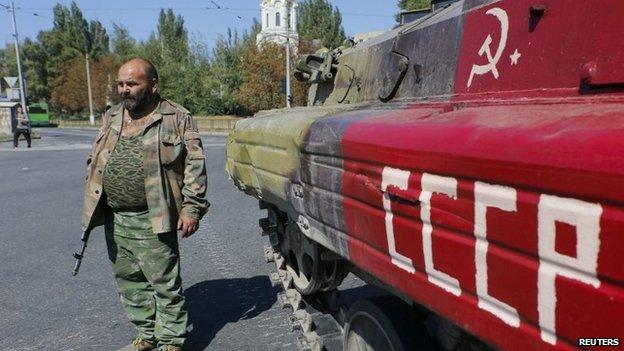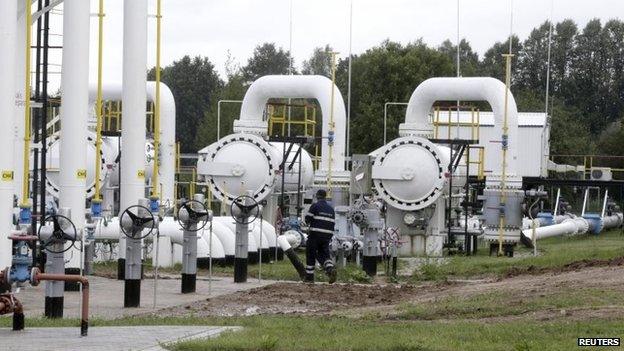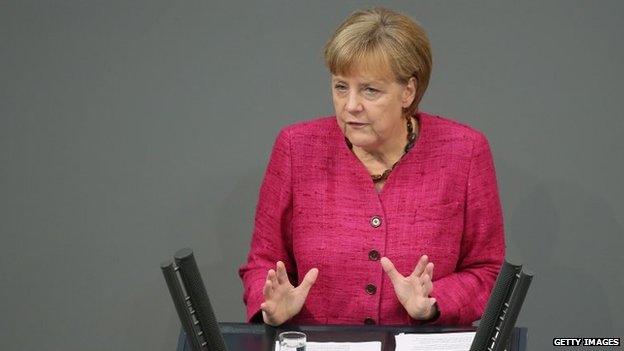A peace project at a time of war
- Published
- comments

Europe is struggling to react to the emerging reality of "New Russia" in Ukraine
At last Saturday's summit in Brussels the EU's new foreign policy chief Federica Mogherini said that, at heart, the European Union was a "peace project".
It is often defended with those words but now it is a "peace project" at a time of war. The known world is receding. And Europe is struggling to adjust to that new reality.
Others too are having to react to a Russian president who speaks of Novorossiya, of the unknown and ill-defined country of New Russia.
So on his way to the Nato summit in Wales, President Obama will on Wednesday divert to the Estonian capital Tallinn.
There he will reassure the increasingly anxious Baltic states and Poland that they can depend on Nato guarantees.
The American president will "reaffirm our unwavering commitment to the defence of our Nato allies". The message to the Kremlin has been summed up by the White House as: "Russia, don't even think about messing around in Estonia or any of the other Nato members."
To back up those guarantees, Nato looks set to create a new rapid reaction force which would bring 4,000 troops to, say, one of the Baltic states in 48 hours. Equipment and logistics will be pre-positioned so that, in the words of the Nato secretary general, the troops can "travel light but strike hard".

The Baltic states, like much of the rest of Europe, depend on Russian gas for their energy needs
Putin smells weakness
What unsettles the Baltic states is that President Putin has spoken of the right to intervene to protect the interests of Russian speakers.
About 25% of those living in Estonia are ethnic Russians. It was not difficult during a brief trip to a Russian market in Tallinn to find those who both like the Russian president and see him as a protector - although they tend to be from the older generation.
So President Obama will reaffirm the unity and the strength of the alliance but that will not change the situation on the ground in Ukraine - and that comes back to the will and determination of Europe's leaders.
At times during this crisis, Europe has given the impression that it would rather do anything than stand up to Russia - and President Putin is a leader who smells weakness.
I am told that some European leaders felt almost insulted by Russia when they were briefed by the Ukrainian president last Saturday on the extent of Russian involvement in eastern Ukraine.
In March the Kremlin had told them the so-called "green men" had nothing to do with the Russian military and now they were being told there were no Russian units on Ukrainian territory.

Chancellor Merkel's stance on Russian involvement in Ukraine has hardened
At the start of the crisis, German Chancellor Angela Merkel had been cautious and tried to keep open a channel of communication with the Russian president but now she feels deceived and, despite all the lobbying from the German business community, she has backed tougher sanctions whatever the economic cost.
"Accepting Russia's behaviour is not an option," Mrs Merkel says. She sees Russia as openly challenging the post-war European order.
There are doubters; the Hungarians, the Slovaks and the Czech Republic are against further sanctions. Even so the EU will almost certainly agree another round of sanctions later this week in coordination with the G7.
They will possibly enforce a ban on all Russian state-owned companies borrowing or raising capital in Europe. It sounds tough but most of these Russian entities don't need to raise equity. To really hurt the Russian economy, Europe will have to slash its dependency on its oil and gas.
'Time of darkness'
Europe's leaders are struggling with their response. Some leaders believe that they need to unfurl a big economic stick to have any hope of reining in President Putin. Others fear it will only further provoke the Russian leader.
Europe's leaders like to say there can be no military solution to the crisis. The trouble is that President Putin thinks there can be.
Europe's dilemma is that if Russia succeeds and carves out some kind of separate entity in the east and south-east of Ukraine, the borders of a sovereign European country will have been changed by force and the EU will be exposed as weak and indecisive.
Already Ukrainian ministers are warning of a "great war" with Russia. If the fighting intensifies it will not be limited to eastern Ukraine. Ukrainians will continue the struggle and, almost certainly, will acquire weapons and support from abroad.
For the EU this crisis challenges its unity and its resolve. A peace project in a time of war may well require different skills than the exercise of soft power.
Mrs Mogherini perhaps understood the enormity of what Europe is facing when she described the era as "a time of complete darkness".